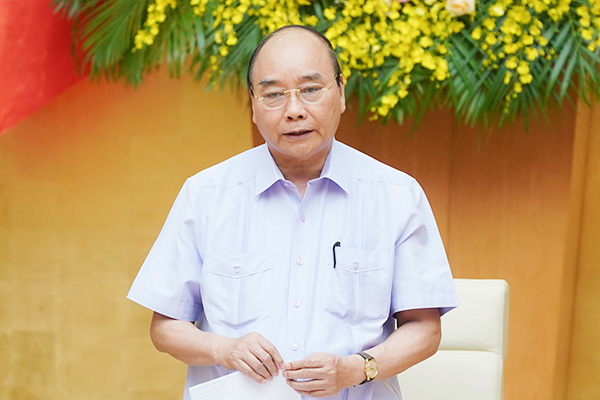
At an online meeting with relevant agencies and leaders of 63 provinces and cities on e-government yesterday, PM Nguyen Xuan Phuc, Chairman of the National Committee on E-Government, praised the Ministry of Health, the Ministry of Information and Communications for their effort to promote IT application and make the most of digital infrastructure to Vietnam’s Covid-19 fight.
He also praised technology enterprises for their contribution of human and financial resources to epidemic prevention, their investment in designing applications for handling, analyzing the epidemic situation, and tracking infected people such as Bluezone and NCovi.
The PM emphasized that the force of more than 50,000 technology firms currently plays an important role in digital transformation in Vietnam. In recent years, e-Government platforms have developed rapidly. The number of provincial-level built-in and data sharing platforms has increased dramatically.
In the past six months, the proportion of ministries and provinces having this kind of platform increased by over three times (in February 2020, only 25 ministries, provinces had that platform, equivalent to 27%. The figure was 76 ministries, provinces by July, or 82.6%). Currently, the rate of level-4 online public services is about 15.9%, doubling that of the same period last year. E-document exchange between State agencies has reached a rate of about 88.5%, very close to the target of 90% by 2020.
The PM said that Vietnamese enterprises have gradually mastered core technologies, and developed technology platforms for digital transformation. He praised the Ministry of Information and Communications for its initiative of holding a weekly launch of Vietnamese platforms to honor and promote Vietnamese ICT products. So far, dozens of platforms have been launched.
PM Phuc requested ministries and localities to soon address shortcomings in legal environment for building the e-government.
He noted that the rate of online public services remains low, which is unlikely to reach 30 percent at the year’s end without new ways of implementation. Some ministries and provinces could only reach less than 10 percent, an alarming level, he added.
The deployment of national database that creates a foundation for the e-government has been slow, especially on land issues, the PM said, adding that it is too late to wait until 2025 as proposed by the Ministry of Natural Resources and Environment.
He urged the Ministry of Information and Communications to map out a training project and a national digitalisation roadmap for localities, as well as complete a draft on the development strategy of the digital government for 2021-2025, with a vision to 2030, in the third quarter of this year.
The Ministry of Public Security was tasked to speed up the building of a decree on the protection of personal data, then submit to the Government for consideration in 2020.
From 2021, the Government will consider conducting e-government ranking for the 63 cities and provinces nationwide, he revealed.
Vietnam ranked 86th out of the 193 countries and territories by the e-government development index (EGDI) in 2020, climbing two places from two years ago, according to the 2020 e-government survey conducted by the United Nations. It ranked sixth in Southeast Asia, behind Singapore, Malaysia, Thailand, Brunei and the Philippines.
|
Advanced technology to be applied on building art, literature database
Prime Minister Nguyen Xuan Phuc has approved a programme to research and build a database and announce Vietnamese art and literature works on the platform of the Fourth Industrial Revolution.
The programme aims to apply achievements of the revolution into the field to effectively implement the Party and State policies on the building and development of culture, literature and art, contributing to fighting the “peaceful evolution” scheme in the field of ideology in the current period.
It targets the announcement of 500 printed books published between the 10th century to 1945, along with 100 3D books introducing artistic works with high historical, artistic and architecture values.
Alongside, it will sumarise 2,000 data items on artistic and literature works in document and non-document forms, while making 50 documentary films to introduce outstanding artistic and literature authors and works as well as art and cultural practices in the community.
A software system will be designed to store and manage all the products of the programme to serve research and data utilisation. Collection of documents and data from various sources will be implemented.
The programme will be implemented from 2021 to 2025, using State budget.
|
